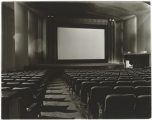Guest Reviewer Hillary Goidell is a photographic artist who loves being a creative sounding board. Having spent equal time in France and the US, she currently lives in Berkeley. Check out her truly wonderful photographs www.hillarygoidell.com
Steven Spielberg’s prowess in touching our full range of emotions has marked several decades of filmmaking. After exploring contexts from gentle science fiction to historical storytelling, Spielberg and screenwriter Tony Kushner now turn to an autofictional tale that embraces the love of cinema.
Throughout the (long) rite of passage story, Spielberg offers a flattering portrayal of himself, played by Gabriel LaBelle as young Sammy Fabelman. On the surface, the story traces the unraveling of a family and the power of secrets. Particularly striking is the scene in which Sammy reveals to his mother that he is aware of her affair. He shares this knowledge not through words but images he’s filmed, the evidence projected, no less, like a camera obscura in Sammy’s closet. All the underlying cinema motifs make for easy metaphors: film as a way to document the world and our lives, as an escape route and also a source of creative torment.
Sammy’s mother is graceful and anguished. Michelle Williams plays her with incredible presence and is entrancing as she dances in the light of the campfire during a pivotal family trip.
The characters as a whole would make fine fodder for a conversational post-film game, “Who is the most selfish?” (I myself side with the father, who winds up regretfully alone but has largely nurtured his couple’s demise: by ignoring the artistic needs of his piano virtuoso wife, and averting his eyes from the romantic relationship that helps her flourish.)
There are annoyingly predictable moments. Haven’t we seen the Jewish in-law Shabbat dinner scene a hundred times? Even quirky scenes lack surprise, like Sam’s teenage romance with Monica, a Jesus- loving high schooler. And yet, we want to laugh with a nostalgic Spielberg.
Ultimately, The Fabelmans is a running commentary on anti-semitism and the American dream, as well as an ode to the history of cinema and an invitation to mourn its decline. The opening scene smacks with something bittersweet. How not to relish the excitement of seeing a grandiose movie theater at full capacity, the audience and Sammy Fabelman spellbound by a lethal train accident playing out on screen? Sure as it does love, cinema excels at showing us death. Aptly symbolic, given the empty seats that greeted The Fabelmans in theaters screenings across the country.
The excellent appearance of Judd Hirsch as Sammy’s uncle places art on a pedestal, however wobbly it can be. We appreciate him for his survival instinct, both on the collective level of the Holocaust and as an individual, maintaining a raucous sense of humor and loyalty to art despite his own thwarted pursuits and challenges.
Major kudos too for David Lynch’s cameo appearance as foundational film legend John Ford. The scene ends the film on what feels like an optimistic and lighthearted note.
For more on the cinema angle, Do We Need Another ‘Love Letter to Cinema’? https://artreview.com/do-we-need-another-love-letter-to-cinema/
